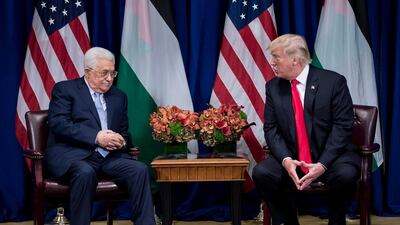A former Arab League secretary general lambasted the United States' peace plan for Israel and Palestine, saying it will be flawed and biased, and rejected by Arab states.
Speaking on the second day of the fifth Abu Dhabi Strategic Debate (ADSD) on Monday, Amr Moussa said the American proposal would be "biased and not giving Palestinians their rights".
Mr Moussa's comments followed US President Donald Trump's announcement that a White House proposal to end the decades-long Israel-Palestine conflict would be announced in the coming months.
“It appears that Trump wants to solve this issue and not manage the crisis. This solution presented is only an Israeli solution, because 99 per cent of the deal serves the interests of one side,” Mr Moussa said.
The diplomat said he expected Palestinian and other Arab leaders to reject Mr Trump's so-called "deal of the century" in the same way they rejected US recognition of Jerusalem as the capital of Israel and the opening of the embassy, cutting funds to UNRWA and expelling Palestinian diplomats from Washington.
______________
More from ADSD:
Soft approach on Iran has failed, Anwar Gargash tells Abu Dhabi conference
'Confused' US foreign policy leading to dangerous domestic game
_______________
“I don’t believe that Palestinians, Jordanian and Egyptians will accept the deal. It cannot be a solution that can be accepted in any circumstance. Excluding Jerusalem from any discussion is a mistake,” he said.
Mr Trump’s strategy shift vis-a-vis Jerusalem overturned decades of US policy claiming the city's status would be decided only through joint Israeli-Palestinian negotiations.
The US president's declaration drew universal condemnation from Arab leaders and widespread criticism elsewhere.
“What will we get in return for accepting and saying this is a good deal? Jerusalem and the issue of refugees is off the table,” Mr Moussa said. The region was “far from reaching a point where the Palestinians will accept certain policies of any deal presented to them".
Mr Moussa stressed that Arab states were committed to the idea of a two-state solution based on the 1967 borders, with East Jerusalem as the Palestinian capital.
“The Arabs have not backed down from the Palestinian issue, it is still alive among the majority of the public opinion, trade unions, tribes,” he said.
Meanwhile, US ambassador and counsellor at the Washington Institute for Near East Policy, Dennis Ross, said that appointing Jerusalem as the capital of Israel should have been presented as part of the plan.
“We don’t know what is in the plan just yet because we haven’t seen it, my impression at this point is that Trump’s administration understands that there’s no deal that doesn’t address both sides,” said Mr Ross.
The Palestinian issue cannot be “wished” away, because it is closely tied with the stability of the region, he said.

